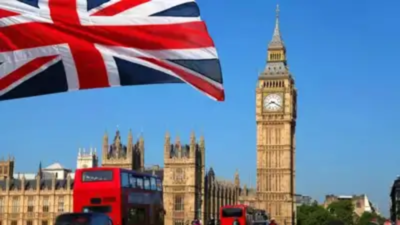Britain’s economy contracted 0.3% in April, the steepest monthly decline since October 2023, as US President Donald Trump’s sweeping tariffs and the expiry of a property tax break combined to derail output, official data showed on Thursday.The contraction was sharper than the 0.1% drop forecast in a Reuters poll and followed modest 0.2% growth in March. The blow to GDP came mainly from the services sector, which shrank by 0.4%, led by a slump in real estate and legal activity following the end of a temporary property transaction tax break. That alone accounted for two-thirds of the GDP decline.Exports to the US fell by £2 billion in April — the largest monthly drop on record — as Trump’s tariffs on global imports, including a 10% levy on goods and higher rates on aluminium and steel, began to bite. Britain remains the only major economy with a bilateral trade deal aimed at shielding it from some of these duties, but core tariffs remain in place, Reuters reported.“The GDP numbers are clearly disappointing,” UK Finance Minister Rachel Reeves said, just a day after announcing a multi-year public spending review worth over £2 trillion.Economists cited not just the tariff shock but also domestic fiscal tightening and the delayed effects of past interest rate hikes as factors behind the slowdown. “Looking through the noise and data quality issues, we expect the underlying pace of growth to remain underwhelming,” said Matt Swannell of the EY ITEM Club.Despite a strong Q1 performance — with 0.7% growth, the highest among G7 economies — the Bank of England last month lowered its 2026 growth forecast to 1.25%, projecting that the US tariff regime would reduce UK output by 0.3% over the next three years.The weak April data complicates the BoE’s monetary policy outlook. While a rate cut is unlikely at next week’s meeting due to persistent inflation concerns, many economists now expect the central bank to ease policy in August.“The door is probably closed on a cut next week, but these downbeat figures increase the likelihood of a policy loosening later this summer,” said Suren Thiru, economics director at ICAEW.Sterling fell nearly half a cent against the dollar after the data release, and government bond yields slipped to a one-month low.Among major sectors, construction was the only bright spot, growing 0.9% in April. Industrial production fell 0.6%, with manufacturing down 0.9%.The Office for National Statistics (ONS) also reported that the UK’s goods trade deficit widened to £23.2 billion in April from £19.9 billion in March, exceeding expectations.Analysts remain cautious about the path forward. “The drag from US trade policy has added to a range of domestic headwinds,” said Swannell, warning that the seasonal volatility seen since the pandemic may continue to skew month-to-month GDP readings.

